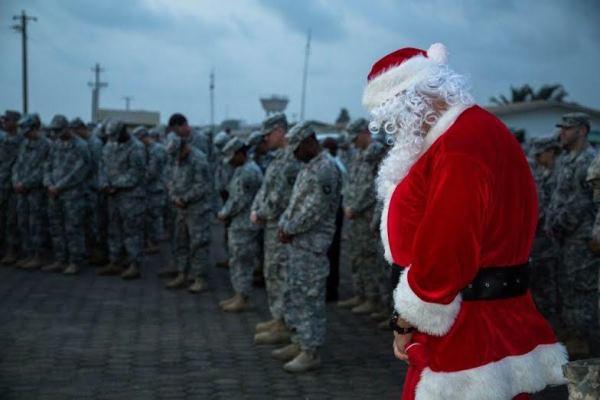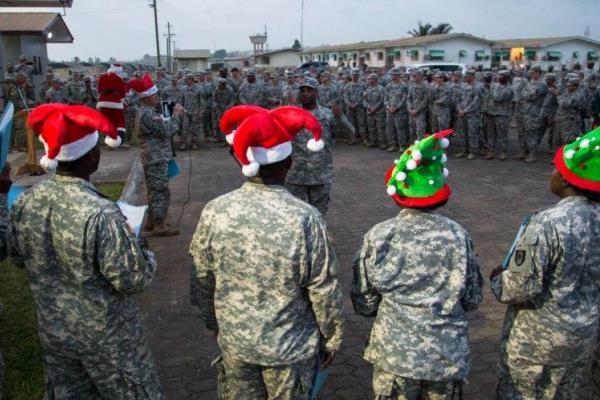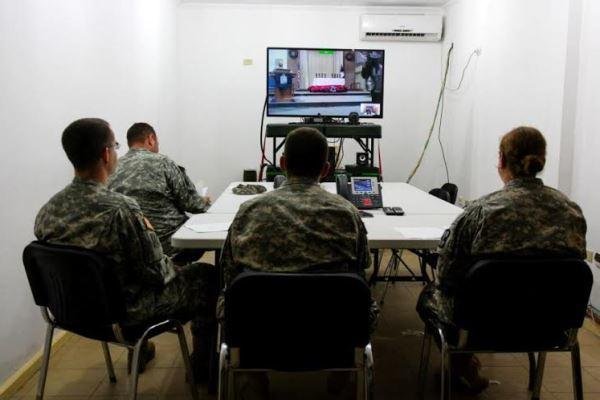The troops have lit a Christmas tree, received a visit from Santa and even held a "Skype Hanukkah" this holiday season, but the focus for U.S. troops in Liberia during the holidays has been on maximizing the gains they've made against the deadly Ebola epidemic.
"It's been a whole lot better of late," Army Lt. Col. David Bowlus, a chaplain with the 2,400 U.S. troops in Liberia, said by phone Tuesday from Monrovia, the Liberian capital.
About five new suspected cases of Ebola have been reported daily in recent weeks, Bowlus said, compared to more than 50 at the end of October. "We're at the point where Ebola is no longer hunting us, we're hunting it," said Bowlus, 43, of Pemberville, Ohio.
For Christmas Day, a Catholic chaplain will be going by helicopter to conduct services at outposts in Liberia for troops serving in Operation United Assistance, the mission led by the U.S. Agency for International Development to combat Ebola, Bowlus said.
Since all faiths are represented in the 101st Airborne Division and other units, the chaplains posted to Liberia have worked hard to accommodate all faiths.
"We don't have a rabbi with us," Bowlus said. So they arranged a Hanukkah service via Skype for four Jewish soldiers with a rabbi in Missouri.
"The top priority here is force protection," which limits contacts with the Liberian people, Bowlus said. "The hearts and minds are already with us here. People here are happy to see us. There really is no threat level for us," Bowlus said. But "we're still not able to interact" with the Liberian people because of the continuing threat from the disease.
Sen. Chris Coons, D-Delaware, who returned this week from the first visit by a U.S. senator to the West Africa region ravaged by Ebola, spoke to the difficulties of maintaining the safety protocols, including washing hands frequently with chlorine and elbow-bumping people instead of shaking hands.
"It's very uncomfortable to be in church and not shake anyone's hand, to not give anyone a hug," especially during the holiday season, Coons said after stopping in Liberia.
In recent elections for the Liberian senate, medical workers with temperature guns at polling stations checked voters for signs of Ebola, which is spread via bodily fluids. Voters were obliged to wash their hands with a chlorine solution, to stand at least three feet apart in line, and to bring their own pens to mark ballot papers.
Since the troops can't readily mingle with the Liberian people, the Liberians have come to them for the holidays.
Bowlus said that the Armed Forces of Liberia choir and the Balawala International dancing and variety group came last week to the U.S. Barclay Training Center in Monrovia to give a two-hour performance.
"It was their way of saying 'thank you' to the American troops," said Bowlus, who has 13 years in the Army - more than five of them as an armor officer with the 4th Infantry Division and with the 2nd Infantry Division in Korea.
Ebola has killed nearly 3,300 in Liberia. The World Health Organization on Monday reported 19,340 Ebola cases in West Africa, including a total of 7,518 deaths in Liberia, Sierra Leone and Guinea, the countries hardest hit by the virus. Sierra Leone has had 8,939 cases; Liberia had 7,830 and Guinea 2,571, the WHO said.
Although progress has been made in Liberia, the number of cases in Sierra Leone has continued to rise, prompting officials there to cancel Christmas festivities to limit the spread of the disease. The U.S. has also begun to consider shifting some military resources to Sierra Leone.
The U.S. will decide by mid-January whether to redeploy troops to Sierra Leone or Guinea, or possibly send some of the troops in Liberia back to the states, Maj. Gen. Gary Volesky, commander of the 101st Airborne and of the U.S. troops in Liberia, said in an interview with The Wall Street Journal.
"If the progress in Liberia continues in the direction it is going in and we don't get told to do something outside Liberia, I expect we would start to redeploy some forces," Volesky said. "If they tell us to do something else, we will do that."
-- Richard Sisk can be reached at Richard.Sisk@military.com
































